Wilkommen in Irak!
In Berlin, a little bit of Baghdad
Walead Beshty and Eric Schwab
Tchaikovsky Street runs through what was once an upscale residential neighborhood. Bulky manor-style houses line the cobblestone road like miniature fortresses, less imposing than quaint. Then, on the south side of the street, a cluster of low-rise modernist buildings crowd in on the cobblestone sidewalk. Pale geometric façades of concrete and glass loom above an apron of listless grass enclosing an asphalt car park. Dentists’ offices and insurance brokerages, the aesthetic suggests—bland residues of an era of bureaucratic de-gentrification. Socialist progress, come and gone.
It takes a moment before you notice the building in the right rear corner: identical to the others but for the overgrown bushes and trees, the boarded-up windows, and the steps and balconies strewn with junk. A heavy metal fence blocks the driveway. The upper-floor balconies are quiet, dark, forlorn. Hints of missing detail suggest a once-ornate entrance, subsequently stripped of insignia. In fact there’s no signage of any kind, no names on the doorbell, no plaques or emblems, no flag on the pole. The front gate is padlocked with a heavy chain.
The gate and fence are hardly chest-high. There’s no “No Trespassing,” no Betreten Verboten sign, the locked gate is a hindrance to nobody but the postman. Go ahead, climb over to the other side of the fence …
Welcome to Iraq.
Courtesy of the German Democratic Republic.
You are now in a sovereignty-free zone.
Officially, there was no such thing as private property in states that were members of the so-called Communist Block. But issues of territorial demarcation and control remained acute. Just three blocks west of here was the Berlin Wall, erected in 1961 by East Germany’s ruling party, the SED or Socialist Unity Party of Germany, on the territorial border with the FRG. Some time after that, this little plot of land must also have been legally appropriated by the GDR, then ceremonially handed over—sold, in fact, for a one-time payment of hard currency—to the State of Iraq, specifically to delegates of the Arab Socialist Ba’ath Party, which took control after the 1968 Iraqi Revolution. The building’s architectural style dates to the mid-to-late-60s period.
In one neighborhood, two extremes of the adage “good fences make good neighbors”: the Berlin Wall, or “anti-fascist protective barrier” as it was officially called in the GDR (notwithstanding the fact that the prototype for the “fascists” that the Wall was built to protect against also had called themselves National Socialists) and this metal fence, a less obtrusive demarcation of a more amicable arrangement between fellow “socialist” states. According to article 22.2 of the Vienna Convention, “The receiving State is under a special duty to take all appropriate steps to protect the premises of the mission against any intrusion or damage and to prevent any disturbance of the peace of the mission or impairment of its dignity.” A wall within the Wall, a kind of diplomatic island enclave. Safe harbor for the socialist jet set—while it lasted.
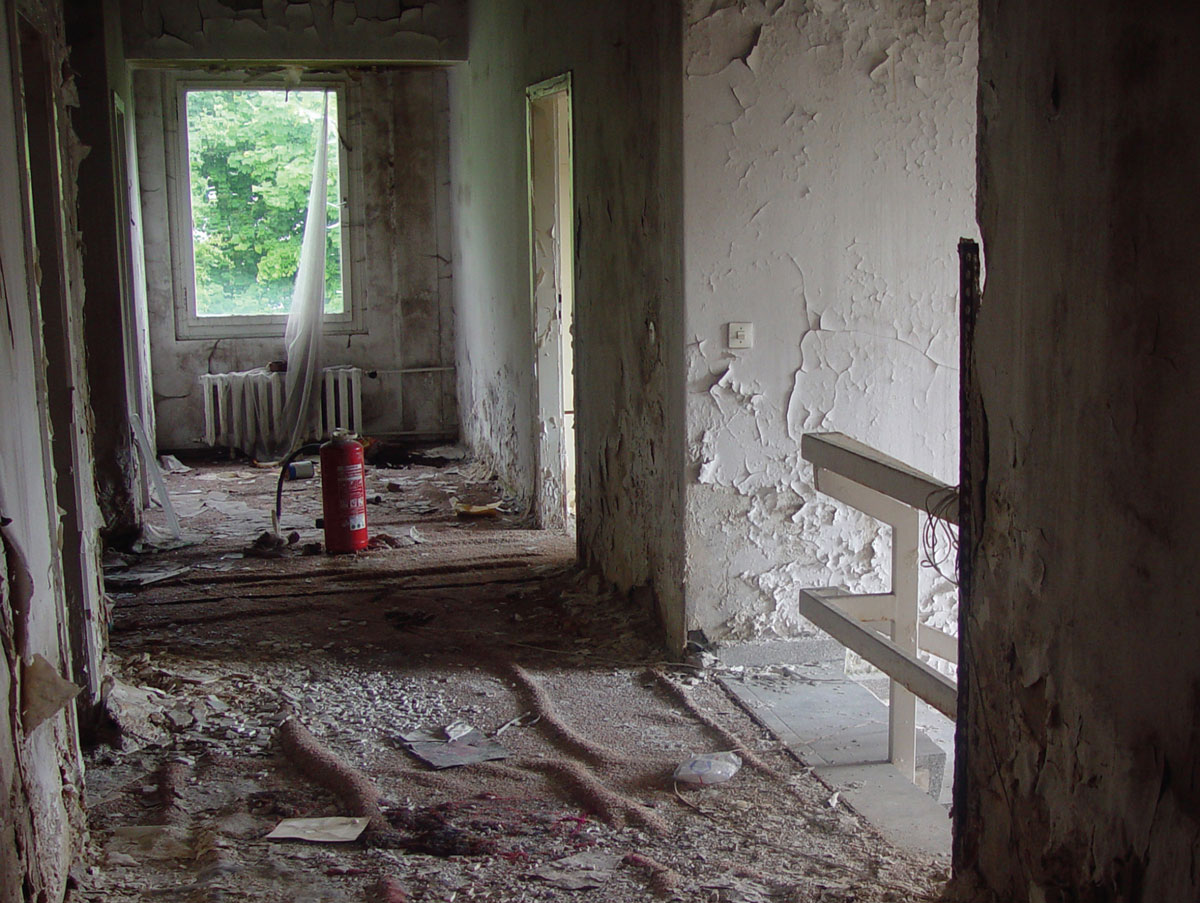
A plot of land: granted, protected, inviolable; then dissolved and abandoned. To abandon has two related, quasi-antithetical meanings: to relinquish control of something to another controlling agency, or simply to cease to control, protect or preserve something altogether. The word is derived from the Old German bannan, “to command” or “summon,” which in turn, depending on context or the character of the ruling authority, could also mean to censure, to curse, to excommunicate or prohibit—as in “banned books.”
In this sense we may understand the house on Tchaikovsky Street as twice abandoned: the first time officially summoned as “eminent domain” by the GDR government in order to be relinquished to the Iraqi government as its special sovereign property, a “protectorate” within the sovereign territory of East Germany yet legally beyond its sovereign domain; and then a second time, roughly twenty years later, when the territorial sovereignty of the GDR government, and soon afterwards its territorial treaties and agreements, simply ceased to exist.
Since then, the Arab Socialist Ba’ath Party, and indeed the sovereign state of Iraq as such, has also ceased to exist, its territory “liberated” into an indefinite state of foreign protectorship. As a consequence, this building and the land that it occupies have fallen under a virtual ban—expropriated, excommunicated, accursed, abandoned not only politically but also practically in the most concrete sense. As urban space it remains strangely unclaimed and uninhabited, a structure without a function and a property that properly belongs to nobody. As a non-property, a Niemandsland, it has outlasted its more famous and once formidable neighbor, the Wall and the “death strip” (Todesstreifen) it enclosed, nearly all of which has since been reappropriated as public or private land—down the street it has been repaved as a jogging path.
In the territorial and legal conditions that constituted this embassy’s “mission,” the paradox of sovereignty is symbolically replayed: as a sovereign space within the state that is nonetheless explicitly outside its sovereign domain, legally exempt from legal control, and as a territorial premises that must be protected by the State yet also remains inviolable, immune to the State’s own sovereign authority. It’s both a miniature doppelgänger of national sovereignty and its blind spot, its objet petit a—that place it holds most dear yet is not allowed to touch.
For Agamben, the crux of the paradox of sovereignty lies outside of the sovereign power itself, in the way it defines who can be subjected to its “ban.” Reviving a neglected concept from Roman Canon law, Agamben describes the sovereign’s subject as homo sacer, the “sacral/sacrificed man”—or in his terms, “a human victim who may be killed but not sacrificed.” Originally this concept applied to persons who, as punishment for a crime, were officially banned, stripped of their rights of citizenship and indeed their very status as persons, so that even killing them could no longer be considered murder—and who for the same reason were henceforth considered unpunishable or even untouchable by any legal authorities. It is from the possibility of the loss of this status, Agamben argues, that the first minimal contours of legal personhood emerge. Here again, the rule is defined by its exception: underlying the very notion of the “sanctity” of human life, that aura of “dignity” that protects each individual as the fundamental limit of most definitions of political authority—today perhaps more than ever before in history, in the modern democratic concept of “human rights”—we discover the most radical reduction of personhood to a “bare life” that cannot and will not be protected. Sacred in the eyes of the Law, perhaps, yet otherwise abandoned to the elements, a citizen only until falling victim to those forces that lie outside the domain of sovereign power—that same outside, that is, from which sovereign power itself emanates.
When you leave Tchaikovsky Street and climb onto the grounds of the embassy, you enter just such a state of exception, ostensibly “outside” the civil rules and legal protections of the German state. Furthermore, once these formerly sovereign premises lost not only their special “protected” status in the GDR but even more so their most basic territorial affiliation with any extant sovereign state, they became, in effect, the outside of that “outside”—not “bare life,” perhaps, but in the most extraordinary sense, “bare earth.” Domus sacer: premises that cannot be sacrificed—sold, transferred, foreclosed—and for that same reason can only be abandoned, left exposed to the elements of nature and vandalism. An “empty form of sovereignty” (Agamben) in its most concrete manifestation.
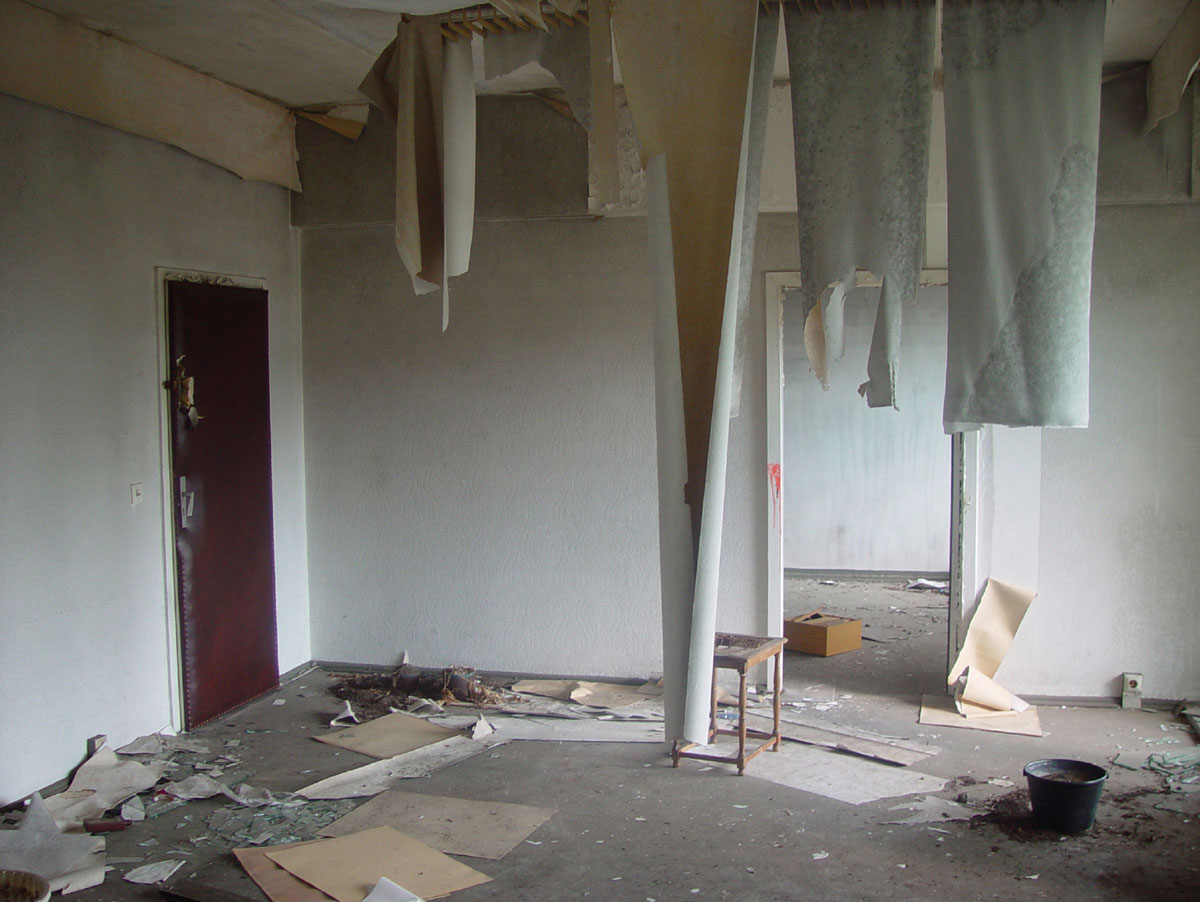
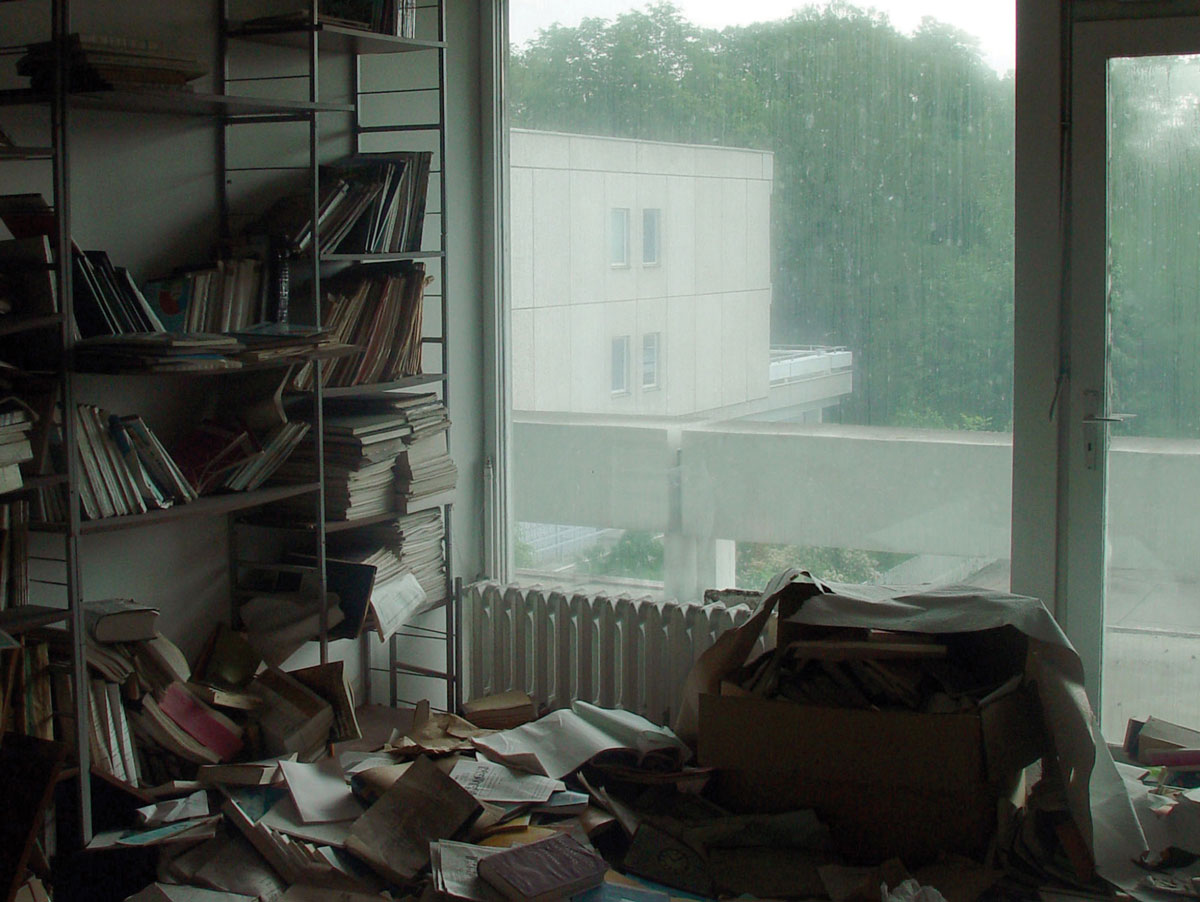
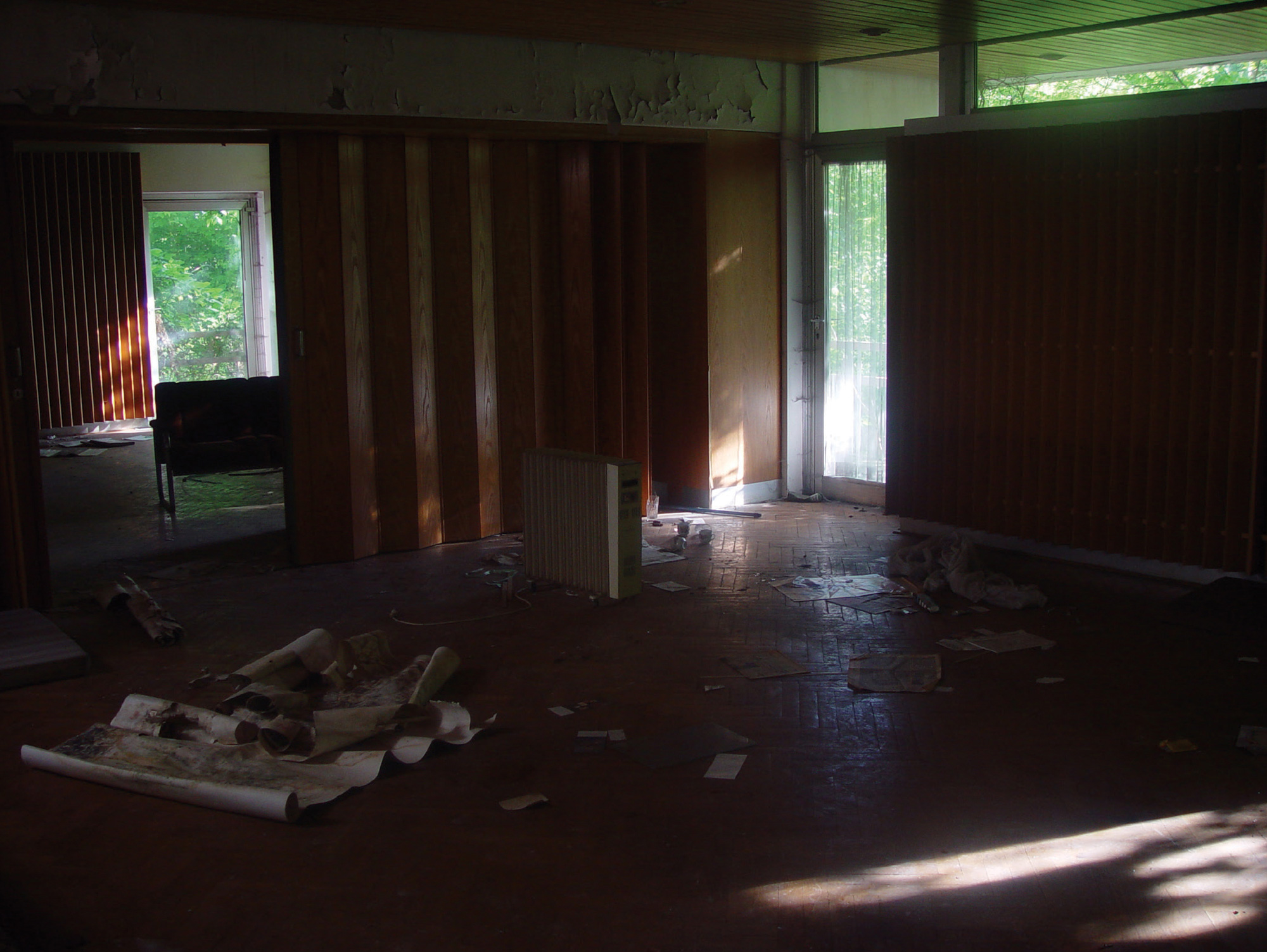
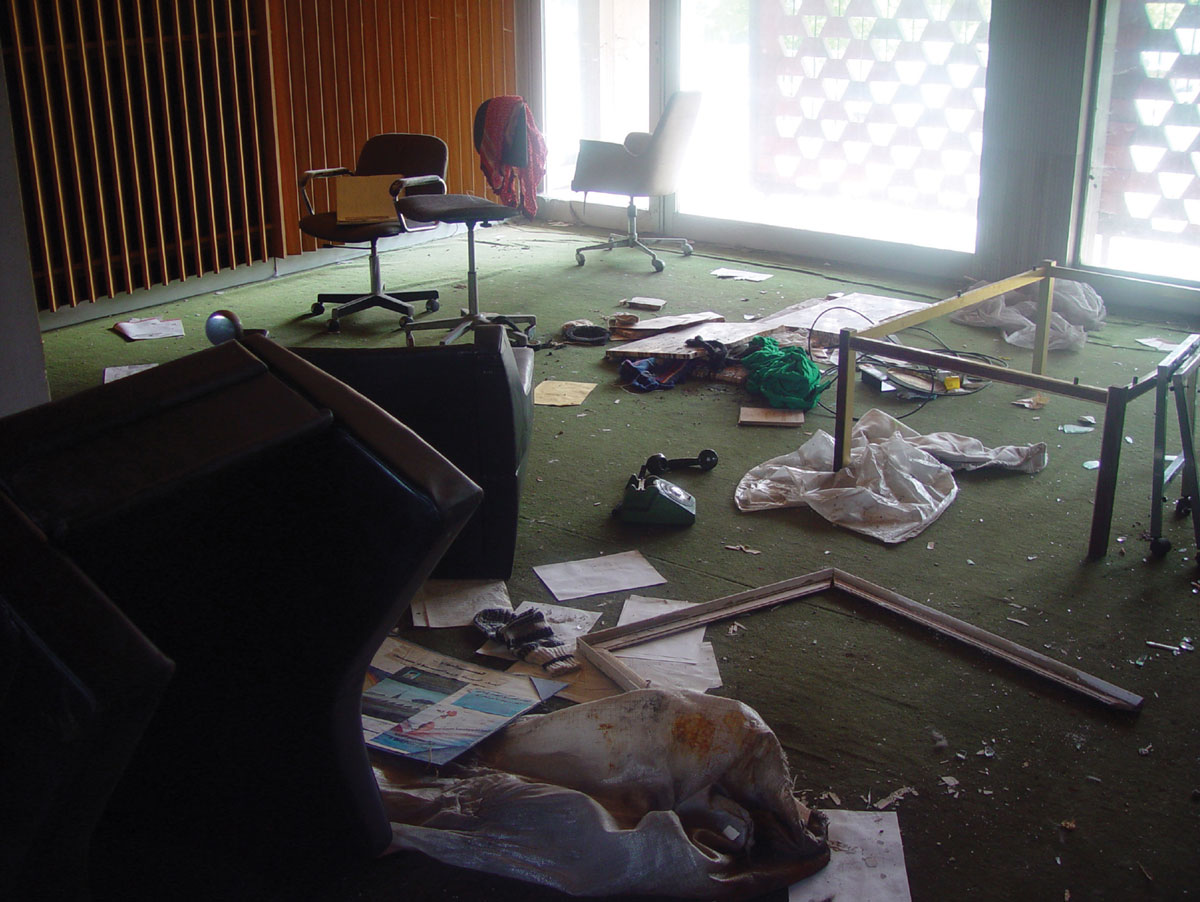
In English, the phrase reckless abandon describes not an object hastily left behind, but rather a heedless state of mind arising from acute excitement or enthusiasm. Here one wonders if just the opposite isn’t the case: Did a moment intervene when a collective sense of reckless abandon suddenly evaporated, when the enthusiasm that had sustained and animated this kitchen, this place as a functional habitation all at once subsided?
You tread cautiously through hallways strewn with peeling wallpaper, decaying plaster, and rotting carpets—notoriously cheap East German construction materials unable to withstand exposure to the elements. Only the plastic fixtures and electric outlets remain intact, as though oblivious to their obsolescence. In the center of a former conference room, wooden chairs with bright red cushions are jumbled high, as though prepared for a barricade or pyre. In the library, another jumble: books and pamphlets once neatly arrayed in hanging metal bookshelves ascending to the ceiling, now collapsed, strewing their contents across the floor. Many titles in Arabic, many in German—dictionaries, lesson books, atlases of world history. What remains on the floor are the byproducts of two cultures, two languages, two systems calling themselves “socialism” and supported by two visions of “world history” that strove to converge here. It’s in retrospect nothing more than an enormous coincidence, a historical-political accident that hardly lasted two decades.
Recklessly abandoned by history, the wreckage of two revolutions. On the floor underfoot, in colorful large-format, a magazine: Fao. Die Geschichte der Befreiung (“Fao: The Story of Liberation”). The cover features a lone soldier standing atop a sandbag bunker amidst desert sand dunes, triumphantly holding aloft an Iraqi flag in one hand and a Kalashnikov rifle in the other; behind him, in a circular inset against the blue sky, like a large desert sun, a smiling Saddam Hussein. A once-glossy commemorative document of Iraq’s most decisive military victory in the war with Iran (the product of yet another “revolution”): the “liberation” of the peninsula Fao, Iraq’s southernmost point and the strategic linchpin for access to the Persian Gulf, which the Iranians seized in 1986 and the Iraqis reconquered by surprise attack in 1988.
Inside, photographs of pristine oases, scarred desert battlefields, cheering crowds of soldiers, and of course many pictures of Saddam Hussein: greeting troops, inspecting equipment, meeting generals, receiving congratulatory phone calls at his desk, solemnly pinning medals on officers and shaking hands with visiting Arab dignitaries. The accompanying text (in German) is alternately encyclopedic—“The area of the Region Fao encompasses 488,085 donem, which corresponds to an area of 1,220 sq. meters”—and hyperbolically triumphant: “After five or a thousand years, fathers will tell their sons of the greatness of the success and of the glorious victory. […] The nation’s subsequent generations will call this the era of the victorious Leader Saddam Hussein.” Also the text of Saddam Hussein’s own speech on the occasion of awarding medals to the Republican Guards: “[…] With God’s help you were able to defend the law and destroy these units of the enemy. And so with God’s help you will bring defeat to the enemy elsewhere.”
Which Iraqi embassy officials were given the task to translate this text into German for the education and edification of their hosts? Were they aware even then, perhaps, of the grotesque irony of enthusiastic invocations of a siegreichen Führer, tausend Jahre, and Gottes Hilfe in the German Democratic Republic, of all places? Did anyone here go so far as to exchange sardonic remarks—perhaps over coffee in the kitchen—about East Germany’s own ongoing battle over foreign-occupied territory, just three blocks away in West Berlin, another strategic “half-island” awaiting “liberation” by the triumphant forces of socialism? Or, to judge from the many copies of Fao still strewn on the floor, did a more conscientious embassy official recognize the grand political-historical-linguistic incongruence of it all and decide to abandon the idea of sharing this bit of “history,” to ban from further distribution among their German hosts this garish memento, however well intentioned? Or perhaps—if the timing is as close as the dates suggest—might it be that it was the Iraqis and their hosts who felt rather like island dwellers on Fao, “liberated” by surprise by yet another version of history, the one culminating in Germany’s reunification?
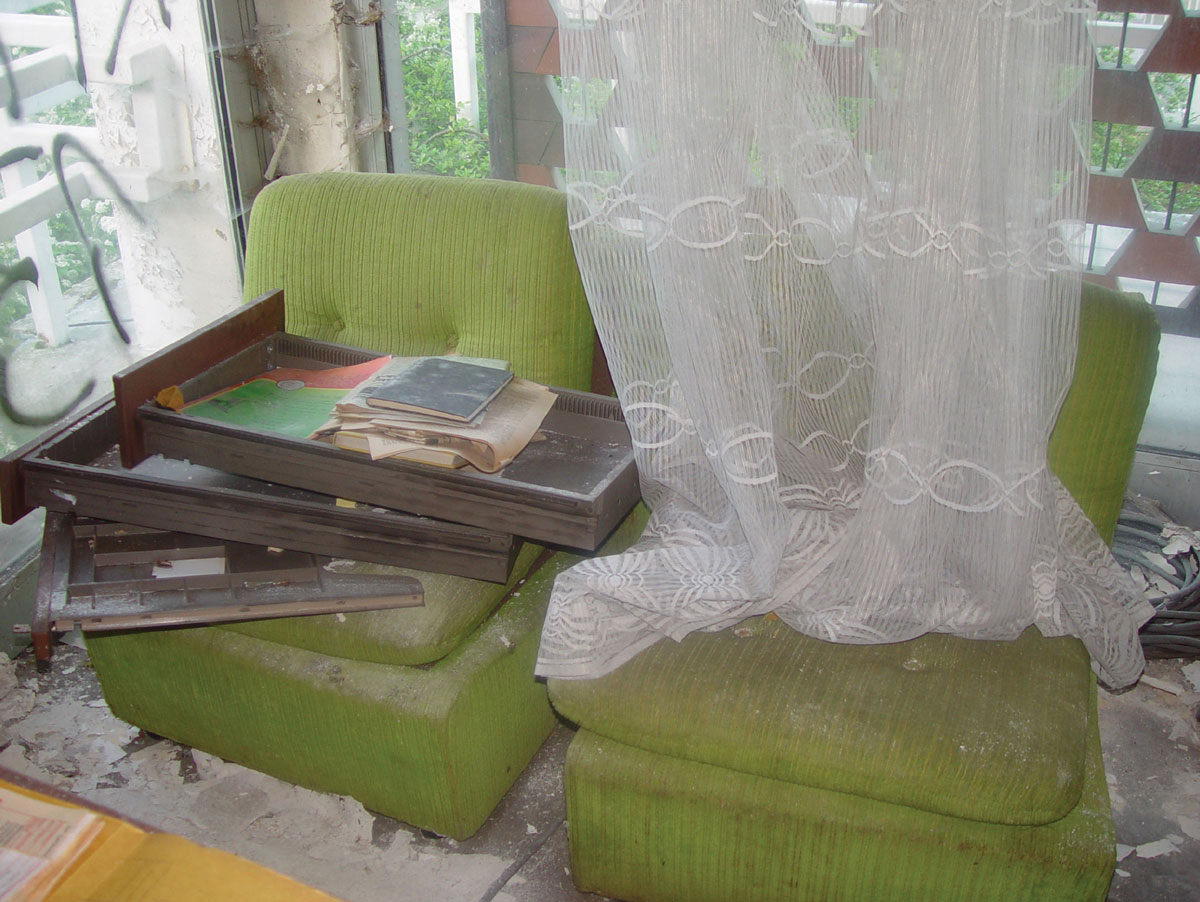
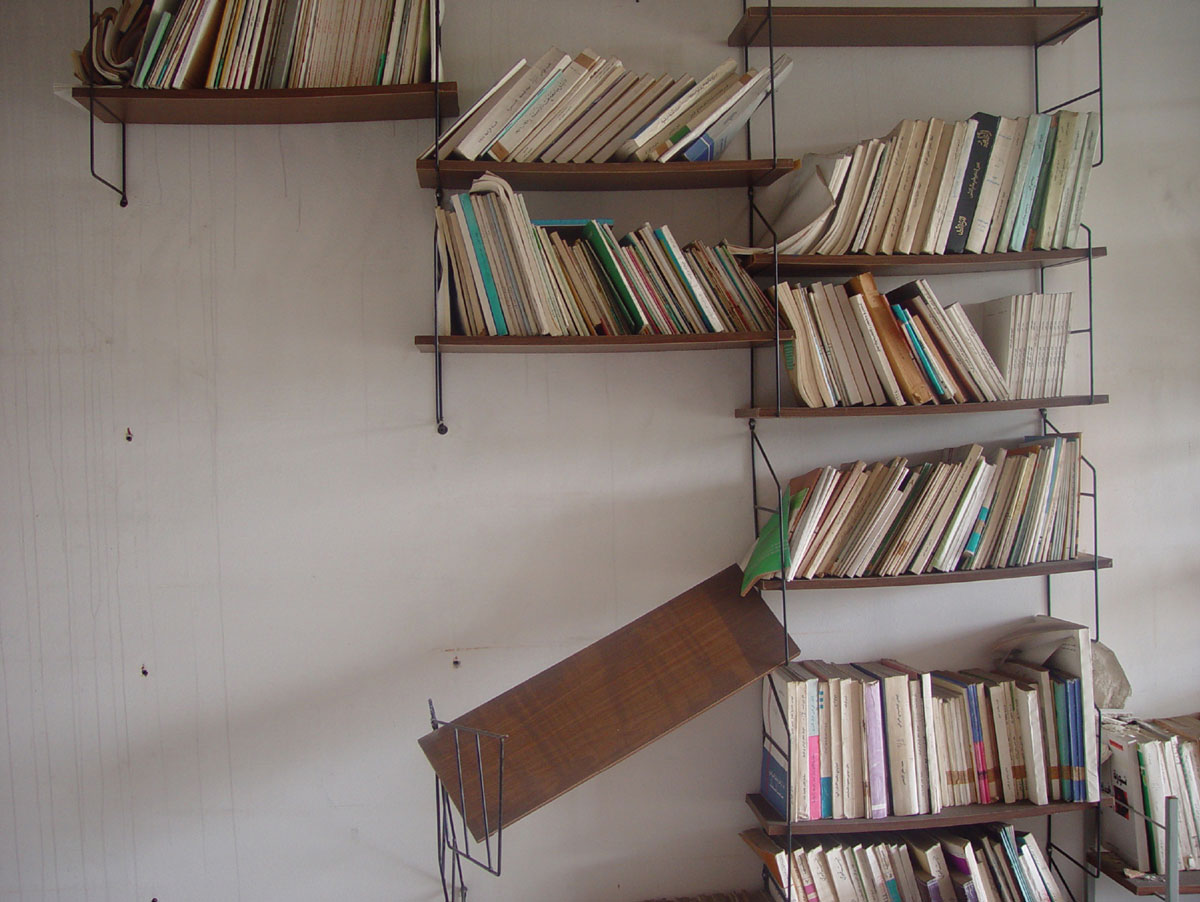

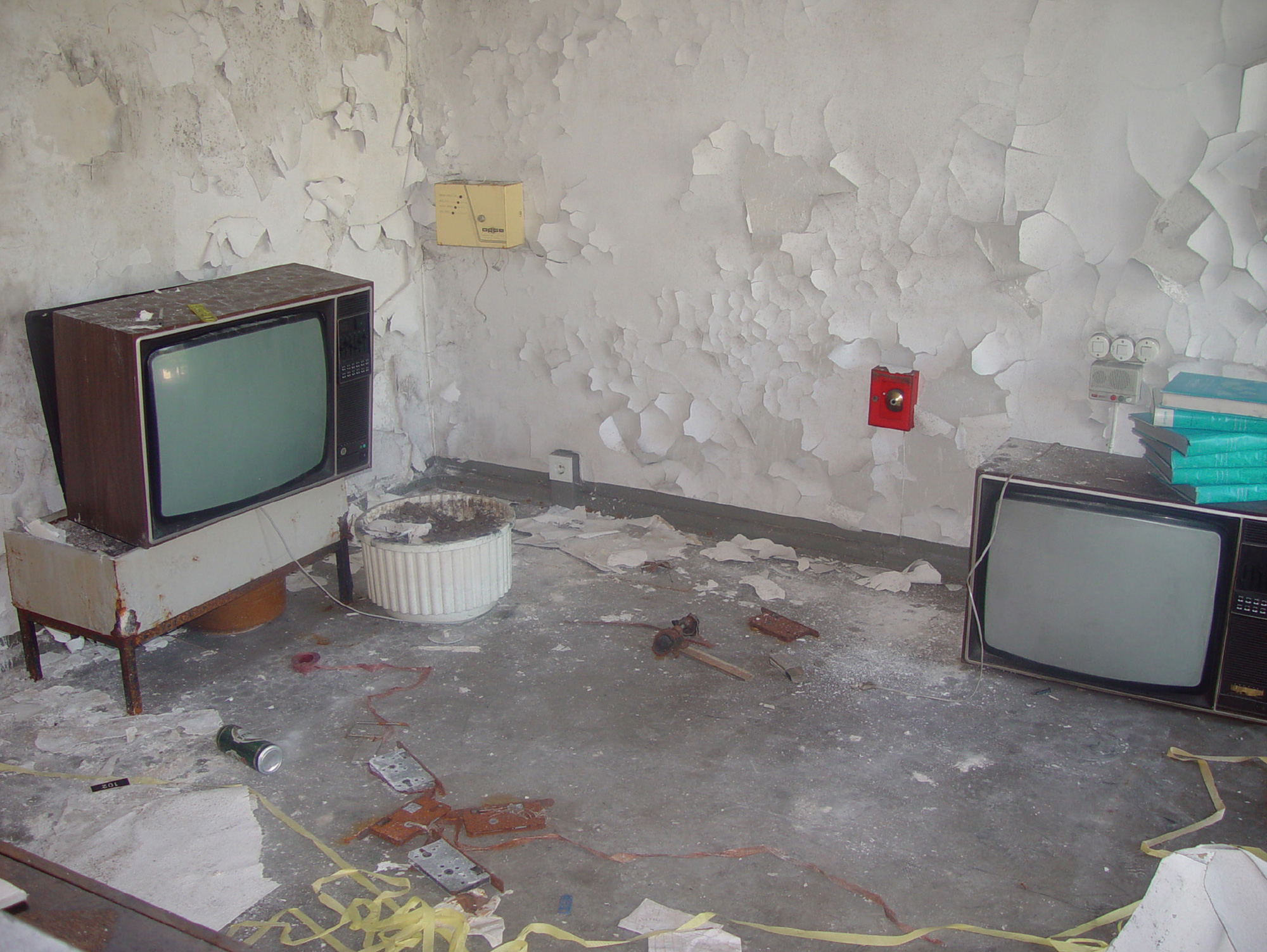
As laconically as it renders the abysmal moral calculus of bombing civilian populations in the name of “liberating” them—a doctrine that the Allies earlier tested in Berlin, among other places—the story needn’t stop there. After all, at least some of the embassy officials who formerly resided on Tchaikovsky Street in East Berlin must have eventually returned to Iraq, to families in Baghdad or Fallujah or Basra. Perhaps already in late 1990, just in time to experience Saddam Hussein’s subsequent attempt to “bring defeat to the enemy elsewhere”—namely in Kuwait—and its aftermath, the bombing of Baghdad.
Today, over a decade after the end of the Cold War, one could argue that Baghdad marks the same implacable battle line between East and West, Orient and Occident that once ran through the center of Berlin. Some view it as a clash of conflicting cultures, others as a battle between democracy and totalitarianism, freedom and tyranny—and both might be right. In any case it’s a conflict currently characterized by competing uses of terms like liberation and freedom. One needn’t necessarily resort to Arabic etymology: Consider the German term used by the Iraqi translators, Befreiung, which contains the Old German root frei. From this stems the English free, while liberate stems from the Latin liber, also meaning “free.” It is almost as if in the American usage of both Latin and German roots, one still heard echoes of the confrontation between the Imperial Roman Legions and the Germanic tribes, the “Vandals” of northeastern Europe, Caesar versus Hermann (Arminius), “civilization” versus “barbarism”—that is, until both terms and cultures were assimilated into a single set of meanings, and a singular sense of civilization, whose opposite has henceforth been whatever resists it: the subterranean forces of “terror” versus the airborne forces of “shock and awe.”
Free of course means everything and nothing: everything because ideally it means free to do anything; nothing because it’s inherently a negative term describing a lack of restrictions or limitations—in America, something that costs nothing is “free.” A strangely empty word that’s on everyone’s lips, full of value when spoken, yet devoid—or one might say, “free”—of any definite sense or image aside from what it isn’t, whatever it’s free from. The word doesn’t name anything specific, “this” or “that,” so much as the possibility of something else, not “this” but … that or that or that. At best then, “free” designates a state of being whose possibilities exceed its actuality; and most often, politically, it designates the possibility of being in a state whose actuality impedes those possibilities as little as possible. In any case, what “freedom” names is less a given, specifiable state than a possibility of passing between states, whether these are mental states, physical states, economic states, or political states.
So what does it mean for one person or state to offer “freedom” to another? If you were able to grant everyone a single wish, like the genie in Aladdin’s lamp, and asked, “What do you want?”—a person might answer: wealth, or happiness, or love; or, more humbly, work, shelter, security. But to offer “freedom”? How is it possible to grant another person everything and nothing? In a way, offering freedom is more akin to the most fundamental choice of all: life or death? In this most extreme sense (and how else is one to understand it when it is backed by aerial bombardment and armored divisions?), the offer of “freedom” recalls the Biblical legend of the Galatians, who sought to distinguish members of their own tribe from Ephramites fleeing across the Jordan river, by forcing them to say a single, otherwise meaningless word, “shibboleth” (Judges 2:16). Those Emphramites who couldn’t pronounce it and said “sibboleth” were executed on the spot. With “freedom” today it hardly seems otherwise. Everyone uses the word, and though nobody can say conclusively what it means, those who are perceived to mean the wrong thing by it are assumed to oppose it and treated as “enemies” of freedom. Or perhaps it’s less a question of what one says than how one says it, not a difference of meaning but simply of who’s speaking and who’s listening. In his 1795 poem “Der Spaziergang,” Friedrich Schiller evokes the distinction between true and false freedom as a subtle difference between correct (rational) and incorrect (irrational) stress: “Freiheit ruft die Vernunft, Freiheit die wilde Begierde.” (‘Freedom,’ reason calls out, ‘Freedom’ cries wild desire.).
… Wait a minute: How did you end up in an abandoned diplomatic mission of extinct states reciting classical German poetry? Now you’re standing in a dank, decaying waiting room; against the wall, dusty plastic chairs waiting haplessly to be sat and waited in. On the receptionist’s counter lies an unopened envelope, smudged with dirt as though it had already been dropped, stepped on, then somehow made its way off the floor and back to its place—delivered, yet still waiting to be opened and state its business. Absently you open the letter—plain white paper, hand-typed in German—and read:
Peace on Earth ... Peace on Earth ...Very Honorable Mr. President Hussein!
Very Honorable Mr. President Bush!
Men who pray to the ONE GOD are with one another
and celebrate the festival of the birth of Jesus—
God comes to make peace.
Children, many children and young people, parents and
old people are with one another.
They ask for peace!
You, highly respected Mr. Presidents, can grant this request.
The undersigned—Leipzig Christians—believe
that the path to peace is the Will of God.
God bless you on the path to peace!
Under the typewritten text and continuing on a second page, 80 signatures in black, blue, and red ink. The uneven, quasi-legible signatures reflexively remind you of the Declaration of Independence—another revolution, another war of “liberation”—yet this is just the opposite: a pathetically respectful, almost subservient plea for “peace.” Although undated, the letter can be situated historically by its addressee: sometime just before the onset of the first Gulf War, late 1990/early 1991. Thus, presumably, also just after the official demise of the GDR, since before that an official letter from “Leipzig Christians” would have been a blatant and punishable act of dissent. Another battle line is recalled here, another gulf between incompatible systems of belief and versions of history, demarcated by another loaded empty word—peace (Frieden), the forgotten shibboleth of the Cold War. As you stare at these crisp sheets of typing paper, it’s getting dark outside—time to leave this place.
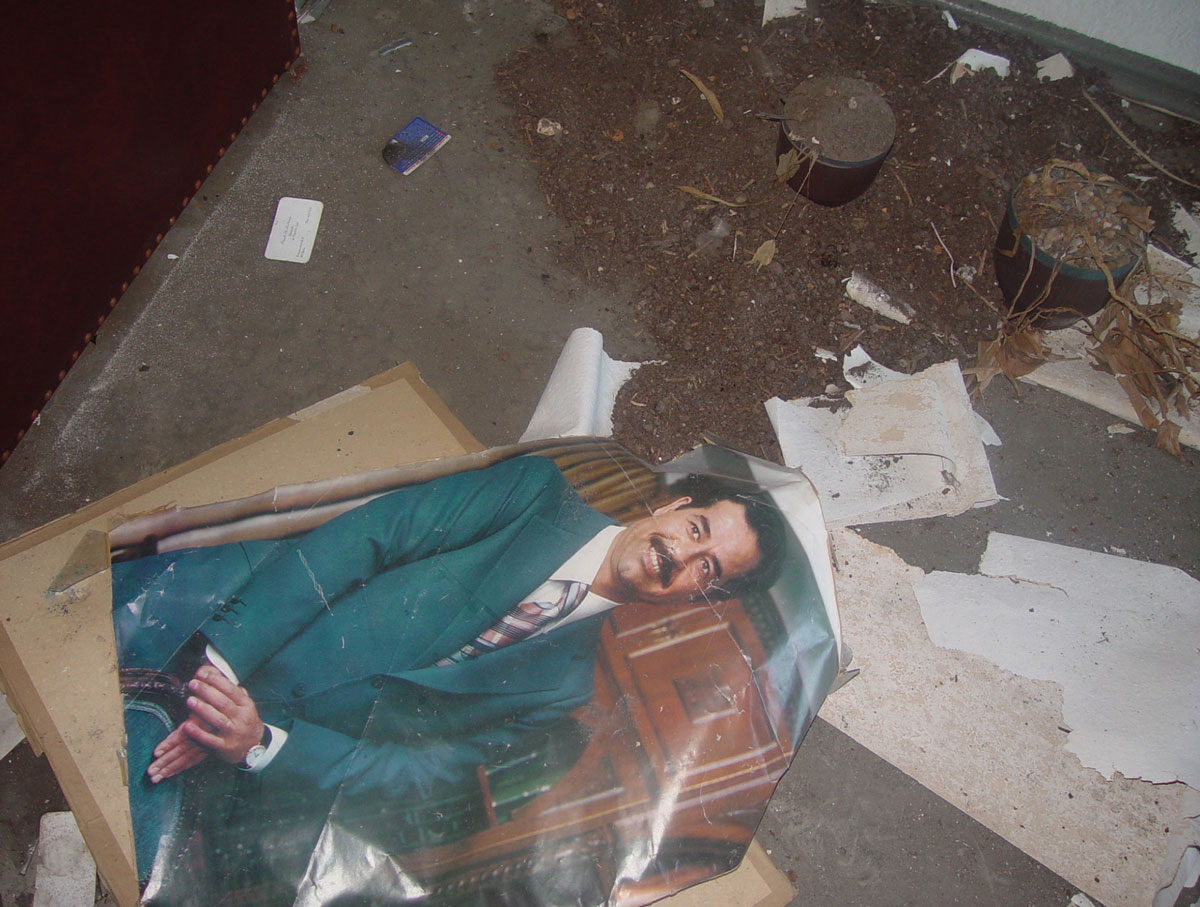
At the crux of the discourse of aesthetics that emerged during the Enlightenment was the concept of taste: an innate faculty of spontaneous judgment as quick as the tongue in its ability to distinguish what pleases it from what doesn’t. Indeed it was this basic autonomy of the sense of taste that spawned the notorious doctrine of the “autonomous” work of art, and not the other way around. The “freedom” of the artist or artwork to do as he/she/it pleases was won, one could say, not by arguments of pure reason or practical utility but by the ineluctable idiosyncrasy of the human tongue. The irony has always been that the tongue, as such, is neither rational nor free—it simply does what it does, tastes what it tastes, and hopes that it’s good. And for all its pretensions to higher meaning, modern art was forced to follow suit.
One consequence of this hegemony of the tongue over the mind’s eye is that, as Kant first recognized, the question of what is art, or what is “good” art, can never be decided on entirely rational-conceptual terms. Good art must be “free” of concepts, Kant concedes; though at its best moments it may symbolize something like “freedom,” it can never really mean it. Much like the word “free” itself, art always means something other than what it seems to mean. Whenever art tries to say something, its tongue gets in the way; and by the same token, whenever one tries to make someone else—or for that matter oneself—”free,” inevitably one is confronted with seemingly irreducible differences of meaning that leave one tongue-tied: free to eat, or free to starve? Free to obey, or free to refuse? Free to charge any price, or free of charge? Can one choose to be free, or must one first be free to choose? Can one choose what is art, or is art whatever forces us to choose?
Of course the choice to view this house on Tchaikovsky Street as an aesthetic object is clearly more than just a question of taste. Architecturally nondescript, politically all but nullified, neither entirely empty in the present nor undeniably haunted by its past, it’s almost as though the building were holding its tongue. Not as though its tongue had been torn out, not quite—though the hanging curls of wallpaper tempt grim associations. Nor is it exactly speaking in tongues, though the books in many languages scattered on the library floor silently babble reminders of Babel’s toppled tower, whose legendary location is just west of Baghdad. Rather, behind its blank façade this building seems simply to have fallen silent, resting its tongue like the chiffon curtain resting patiently on the chair in the reception hall, apprehensively tasting the wreckage of history that surrounds it, as reticent and elegant as Klee’s angelus novus (as Benjamin imagines it). Sovereign yet stateless; autonomous but abandoned; free yet strangely tasteless—suspended between senses and concepts that aren’t quite mutually exclusive yet still demand a choice, affirmation or refusal of a possibility that itself comprises hardly more than a chance to enter the “topological zone of indistinction” (Agamben) between art and politics, nature and history, freedom and bare life.
Climbing back over the fence as if disembarking from a peculiarly disconcerting carnival ride—call it “Journey to the End of History”—you re-enter the historical-political present: in the newly unified capitol of recently unified Germany, at the center of unified Europe, in an innocuous office park just off Tschaikowskistrasse, in the district of Pankow in northeastern Berlin…
Text by Eric Schwab. Photographs by Walead Beshty.
Bibliography
Giorgio Agamben, Homo Sacer: Sovereign Power and Bare Life, trans. Daniel Heller-Roazen (Stanford: Stanford University Press, 1998), pp. 49–50, 83.
Dan Diner, Das Jahrhundert Verstehen. Eine universalhistorische Deutung [Understanding the Century: A Universal-Historical Interpretation] (Frankfurt: Fischer, 2000). The Onion, vol. 39, issue 11, 26 March 2003.
Walead Beshty is an artist and writer currently based in Los Angeles. His writing has appeared in Afterall, Aperture, Artforum, Influence, Site Journal, and Texte zur Kunst. He currently has two one-person shows on view, The Phenomenology of Shopping and Dead Malls at P.S.1/MoMA Contemporary Art Center and The Body-Body Problem at Wallspace Gallery, New York. In 2004 his work was included in numerous group shows including Self Evidence: Identity in Contemporary Art at the DeCordova Museum, Lincoln, MA; and Buy American at Gallerie Chez Valentin, Paris. He teaches in the Art Department of UCLA.
Eric Schwab, formerly an assistant professor of German literature and philosophy at Yale University, is currently studying law at the University of Chicago.
Spotted an error? Email us at corrections at cabinetmagazine dot org.
If you’ve enjoyed the free articles that we offer on our site, please consider subscribing to our nonprofit magazine. You get twelve online issues and unlimited access to all our archives.